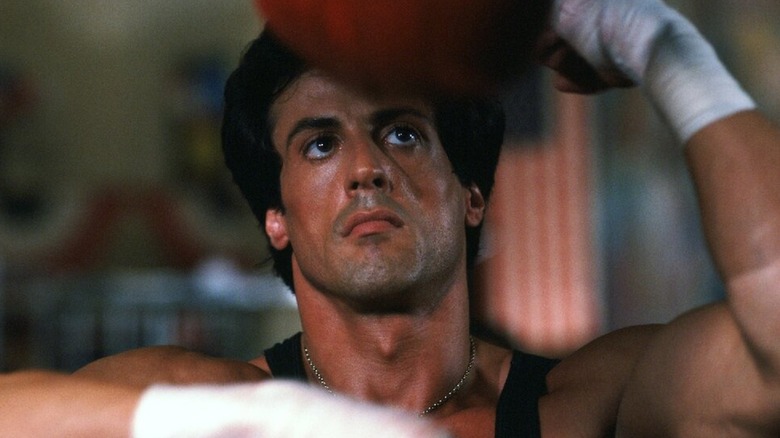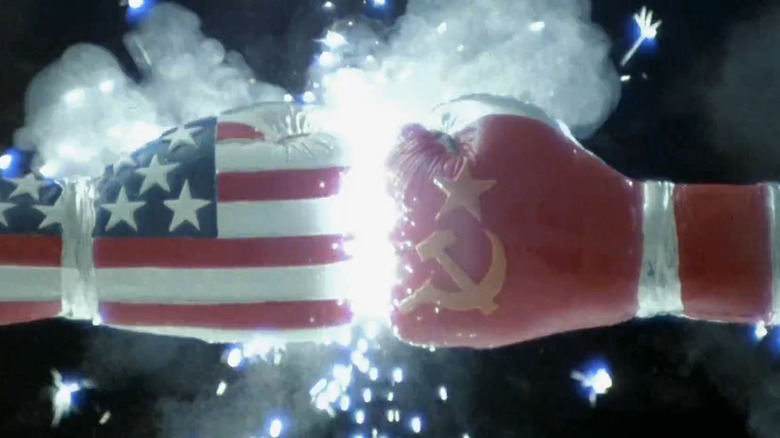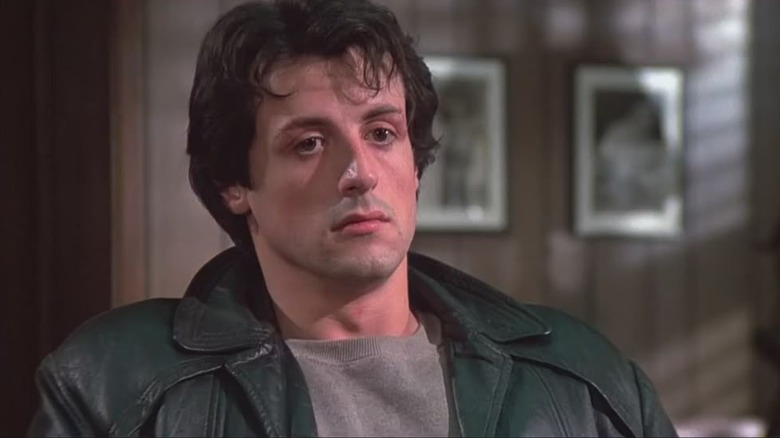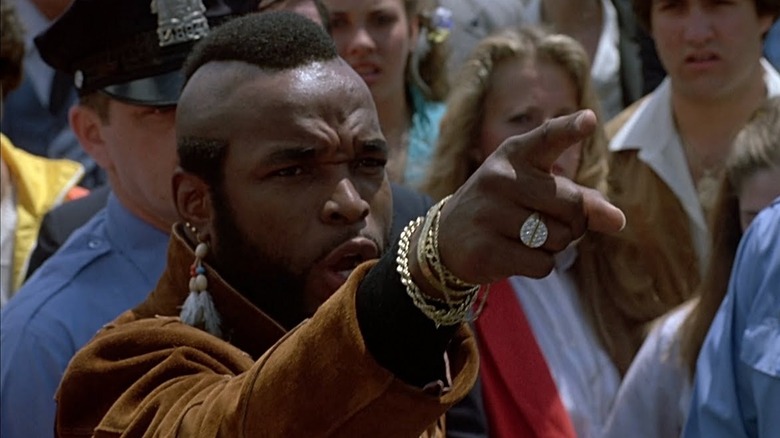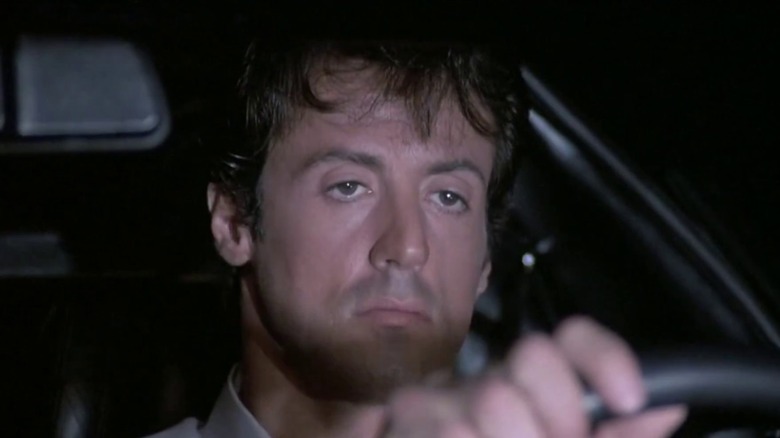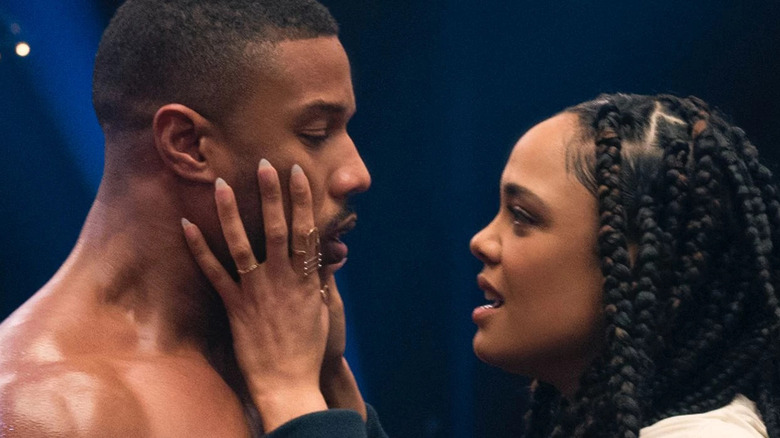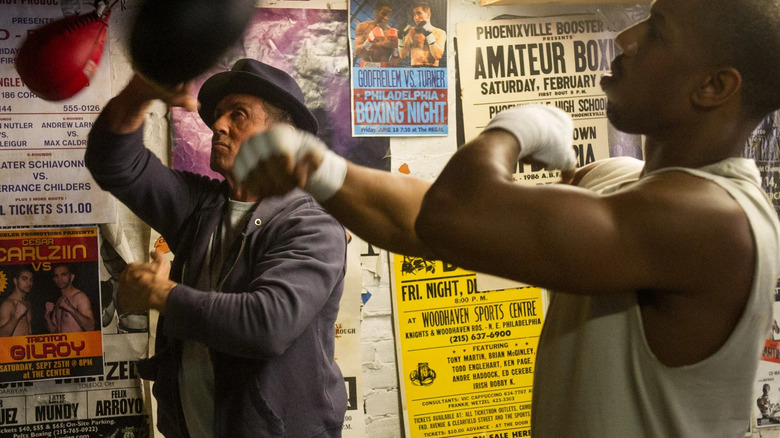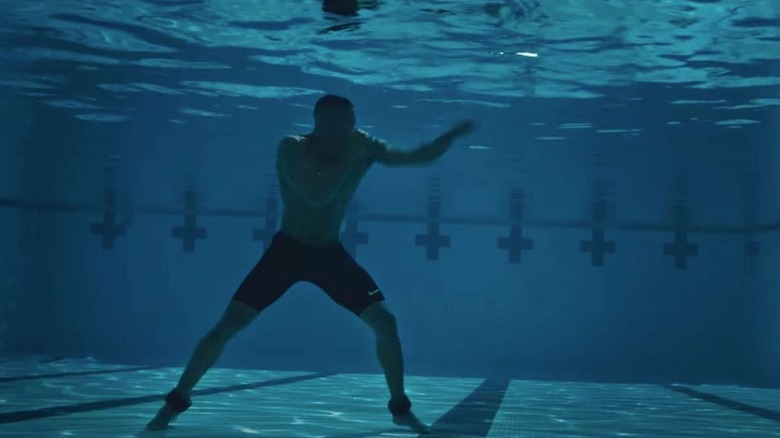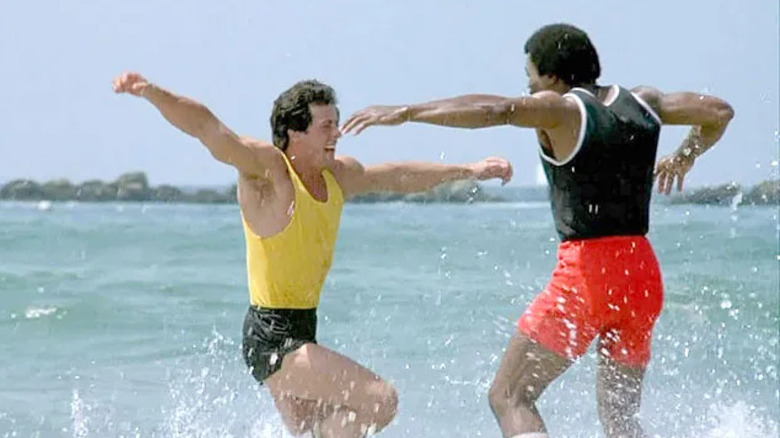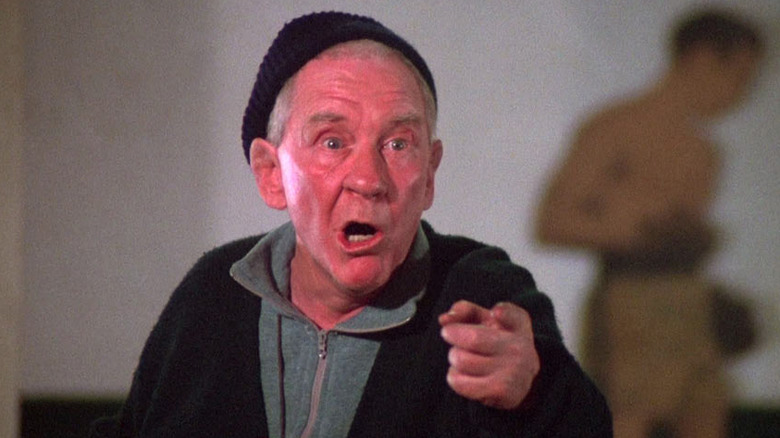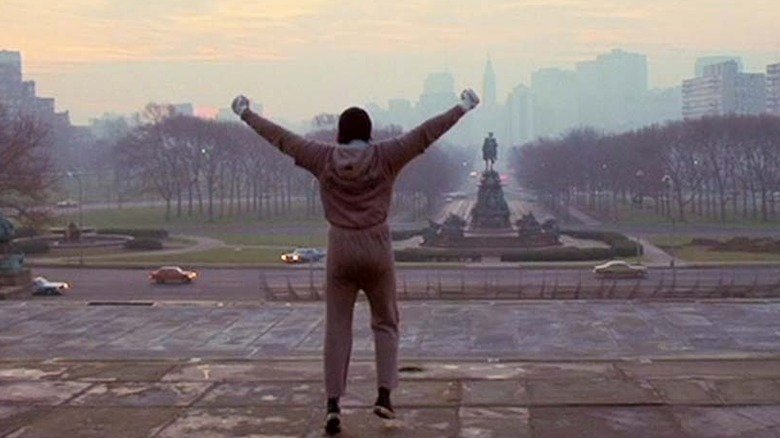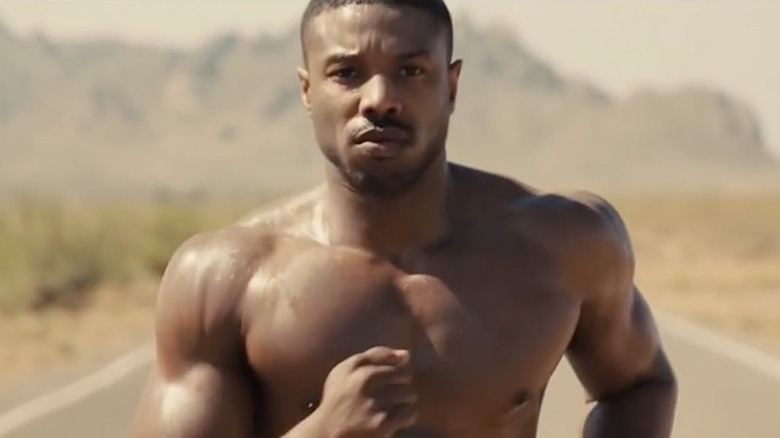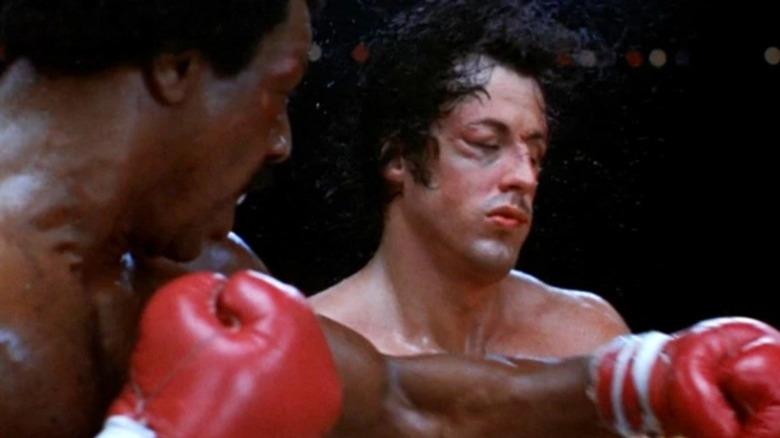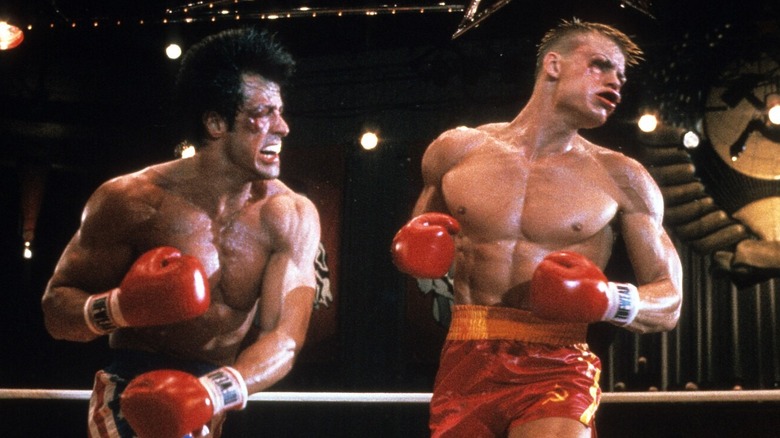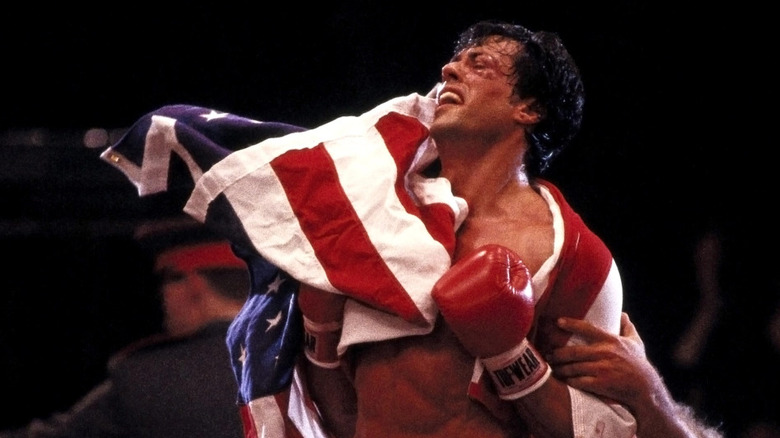Things That Happen In Every Rocky Movie
The movie that made Academy Award-nominated actor and filmmaker Sylvester Stallone a household name was the 1976 sports drama "Rocky," which went on to spawn an entire franchise, including the "Creed" spinoff series. A staple in the late '70s and '80s, the "Rocky" movies have earned millions of fans worldwide and remain one of the iconic sports film series of all time. Across the long-running series, tropes appear throughout the franchise that have existed since the original film and have given the movies a bit of reliable, fan-favorite formula.
Here are all the major recurring tropes that surface in every "Rocky" film as boxers Rocky Balboa (Sylvester Stallone) and his protégé Adonis Creed (Michael B. Jordan) take on the fiercest fighters in the world. While modern sensibilities have led to some noticeable changes to the sports franchise's winning formula, the core elements of the movies remain as sterling as ever as "Creed" carries the torch forward.
The title card and opening scene set the stage
To herald Rocky's latest cinematic adventure, the movies from the original series open with a brass-backed triumphant fanfare over the title card. 1985's "Rocky IV" subverted this formula somewhat by replacing the orchestral fanfare with an excerpt from Survivor's hit song "Eye of the Tiger," which memorably closed out "Rocky III." The fanfare would make its return with 1990's "Rocky V" and 2006's "Rocky Balboa," returning the franchise to its roots.
Following the title card, the first four sequels included a flashback to the climactic bout from its immediate predecessor, reminding audiences of what transpired. Rather than rely on flashbacks, "Rocky Balboa" and the first two "Creed" films feature a prologue introducing each of the respective movie's major characters. Both "Creed" movies go one step further in differentiating themselves from the main "Rocky" series by having the prologue precede the title card, with ominous music playing over it instead of the fanfare.
The hero's chances of winning against his opponent are dismissed
Rocky is initially introduced as a no-name amateur boxer whose entire career is a million-to-one shot in even being able to step into the ring against heavyweight champion Apollo. Even after Rocky eventually wins the heavyweight title himself, that underdog aspect has always been a defining feature throughout the film series and its spinoffs. Whether it's Rocky and Adonis facing off against opponents who are nominally their physical superior or facing their own issues regarding age or past injury, the odds are always running against them.
A recurring trope amidst later films in the franchise is that Rocky or Adonis is going up against a boxer who previously beat them — and beat them badly — in an earlier bout. The climaxes of "Rocky II" and "Rocky III" lead up to rematches between Rocky and Apollo and Clubber Lang (Mr. T), respectively, two men who pummeled the Italian Stallion within an inch of his life. "Rocky II" and "Creed II" go as far as to have their respective protagonists still nursing injuries from their earlier fights to further tip the scales against their favor.
Each of the hero's opponents underestimates him before the fight
While Apollo dismisses Rocky as a nobody, he isn't the last person to write off Rocky but he pays dearly for underestimating his opponent like everyone else in the franchise. Clubber surmises that Rocky is pitted against intentionally weaker opponents to stay on top and has become soft as a result, an assessment that does not change going into their rematch. Later in the series, Ivan Drago (Dolph Lundgren), Tommy Gunn (Tommy Morrison), and Mason "The Line" Dixon (Antonio Tarver) all feel Rocky is past his prime.
This dubious distinction carries over to Adonis as he followed in his father's footsteps to become a heavyweight boxer in a bid for the championship belt. In 2015's "Creed," light heavyweight champion Ricky Conlan (Tony Bellew) believes that Adonis is simply riding on his late father's coattails rather than being a legitimate challenger. After defeating Adonis easily in "Creed II," Viktor Drago (Florian Munteanu) feels he will similarly triumph in their rematch only to realize too late that this was a grave miscalculation.
The hero endures their own crisis of confidence
While Rocky and Adonis may appear unflappable to the public, the two boxers have their own natural doubts and anxieties about their chances in the ring ahead of their respective big fights. Rocky goes as far as to privately admit to Adrian that he's scared of his impending rematch with Clubber while going on a moody car ride in "Rocky IV" while contemplating fighting Drago. Despite all of this uncertainty, however, Rocky finds the gumption to get back in the ring, often using that doubt to fuel his training.
This distinction has carried over to Adonis as well, with the young fighter quietly less assured of his abilities in his quiet moments than he lets on in with his boisterous public persona. Adonis is particularly shaken up by the brutal defeat he receives during his first fight against Viktor Drago in "Creed II," becoming withdrawn. Fortunately, after making amends with Rocky, Adonis trains harder than ever before to regain his confidence and take on Viktor for a rematch.
The hero is fueled by their love of family
The fire fueling Rocky and Adonis isn't necessarily a burning desire to be the best boxer in the world or the pure thrill of the fight but what their respective families mean to each of them. Rocky fights for the love of his wife Adrian and his son Robert across the first six films in the series. In the "Creed" spinoffs, Adonis initially gets in the ring in memory of his late father, with his fiancée Bianca (Tessa Thompson) and their daughter Amara giving him the motivation he needs to triumph.
Without this motivation, the two fighters are seen floundering and unfocused, with Rocky particularly affected whenever he doesn't have his family's support behind him. With Adrian unsupportive before becoming comatose in "Rocky II," Balboa only trains half-heartedly for his rematch against Apollo before she recovers and encourages him to fight. Similarly, Rocky escalates his training regimen in "Rocky IV" after Adrian reunites with him in Siberia to prepare for his fight against Drago, giving him the edge he needs.
The hero embarks on a training montage before the fight
One of the most memorable sequences in any "Rocky" or "Creed" film is the requisite training montage as Rocky and Adonis prepare for the climactic bout in a given movie. Always featuring plenty of running to build stamina, the boxers work out steadily to hone their fighting skills and physique for the big fight. Along the way, the fighters are seen noticeably improving to chart a sense of progression as their grueling journey to the boxing ring nears its end.
Several movies in the franchise actually possess multiple training montages, either to serve as the lead-up to multiple fights within a film or to mark a brief break in the workout. "Rocky IV" is a prime example of this, with Rocky training in Siberia with just his corner team at first, with the second montage showing Adrian supporting him. "Rocky V" changes up the formula by having Rocky mentoring his protégé Tommy in a montage, presaging his trainer role in the "Creed" films.
Each training sequence has an unusual method to improve physique
While the majority of the training montages feature plenty of tried and true exercise routines to empower Rocky and Adonis, there is always some sort of unorthodox methodology they use to give themselves an edge. This tradition dates all the way back to the original "Rocky" movie, with Balboa drinking raw eggs and punching raw sides of beef to prepare for his fight against Apollo. Some of the more bizarre exercise routines appearing in the main series include chasing a live chicken in "Rocky II" to build speed and pulling a dog sled in "Rocky IV" to build endurance.
With Rocky undergoing chemotherapy in the first "Creed," Adonis resorts to finding ways to continue his training in the hospital so he can remain by his mentor's side. "Creed II" features a montage ahead of both of the fights against Viktor, with the first having Adonis train underwater while the second has Rocky employ unorthodox methods for his protégé. While some of these methods certainly raise an eyebrow in regard to their effectiveness, the triumphant results are much harder to question.
Each training montage ends with the hero running triumphantly
The linking exercise technique across each of the montages is running, whether it's Rocky running through Philadelphia at dawn or in a remote location to take advantage of the solitude. The montage concludes with a victorious moment at the end of each run, heralding the boxer ready to take on their opponent. The 1976 original film and many of its sequels end the sequence with Rocky iconically reaching the top of the Philadelphia Museum of Art but there have been variations on this formula across the franchise.
"Rocky III" and "Rocky IV" change up training locations, with Rocky running on a beach alongside Apollo near Los Angeles in the former and alone up a Siberian mountain in the latter. The "Creed" films each provide their own twist on the running imagery for Adonis while the young fighter is in training. The 2015 film has Adonis running alongside minibike riders in South Philadelphia while its 2018 sequel has Adonis running on a dusty road in the desert ahead of his rematch against Viktor.
A grizzled mentor provides words of wisdom
Rocky and Adonis both have plenty of heart and natural talent, but they each find themselves in need of a mentor figure to help provide the guidance they need to take on their opponents. From the first movie through "Rocky III," Rocky looks to Mickey Goldmill (Burgess Meredith) as his mentor, with Mickey appearing as a spectral vision in "Rocky V" to advise Balboa from beyond the grave. Following Mickey's death in "Rocky III," Balboa is mentored by Apollo and Apollo's own trainer Tony "Duke" Evers (Tony Burton), with Tony taking a more central role in "Rocky IV" and "Rocky Balboa."
Following Rocky's retirement, he reluctantly decides to train Apollo's son Adonis when the young man approaches him for guidance in 2015's "Creed." When their relationship is temporarily estranged in "Creed II," Adonis is mentored by Tony's son Tony "Little Duke" Evers (Wood Harris). Even after Adonis and Rocky reconcile, Little Duke remains a prominent part of the Creed corner team to help him face Viktor for a hard-hitting rematch.
An iteration of the song 'Gonna Fly Now' is played
Perhaps the most recognizable aspect of the "Rocky" franchise is its main theme "Gonna Fly Now," written by Bill Conti, Carol Connors, and Ayn Robbins, and performed by DeEtta West and Nelson Pigford. With its uplifting, soaring tempo and boisterous brass section, the theme song has been a staple in the film series and synonymous with the character of Rocky Balboa. With the leitmotif contained in the opening fanfare for most of the films, "Gonna Fly Now" is often played in full for many of the movies' training montage sequences.
Films in the series not featuring Conti as their composer eschew including the full rendition of the song but still contain musical cues and elements from the iconic song. "Rocky IV," with its score composed by Vince DiCola, references "Gonna Fly Now" after Rocky triumphs over Drago, with its familiar melody briefly played by synthesizers. Similarly, both of the "Creed" films feature musical cues and nods to "Gonna Fly Now" in their score, composed by Ludwig Goransson, containing familiar brass flourishes.
A popular contemporary artist lends their voice to the soundtrack
The first three "Rocky" movies were something of a family affair, with Stallone's brother Frank Stallone appearing on-screen to provide some songs to the proceedings. By "Rocky III," the film series was attracting some major musical talent, with popular recording acts including Survivor, James Brown, and John Cafferty and the Beaver Brown Band contributing to the soundtracks. Even Elton John would lend his star power to the franchise, providing the end credit song "Measure of a Man" to the "Rocky V" soundtrack.
"Rocky Balboa" and the "Creed" spinoffs would continue the trend of including a popular recording artist on their respective soundtrack as the franchise moved into the 21st century. Academy Award-winning hip-hop group Three 6 Mafia would contribute to the "Rocky Balboa" soundtrack, helping set the tone for the film. The "Creed" soundtracks would feature an even more stacked line of contributing artists, including Meek Mills, Future, Kendrick Lamar, and Vince Staples.
The hero takes some serious punishment in the ring
Heading into the ring with odds riding against them in every climactic fight, Rocky and Adonis have to each endure a grueling gauntlet of punishment from their respective opponents. With Rocky in particular, the Italian Stallion's strategy to wear his enemies down is to take a staggering number of punches straight to the face. Though unconventional, the tactic succeeds in tiring out the opposing slugger while allowing Rocky to close distance and mete out some pugilistic punishment of his own as the bout progresses.
This trend begins with Rocky's first fight against Apollo, leaving the Italian Stallion blinded in one eye and with a broken nose, with the latter injury repeated in their rematch in "Rocky II." Rocky and Adonis are beaten within an inch of their lives on multiple occasions, with Rocky enduring severe brain damage in "Rocky V" and Adonis having his ribs broken in "Creed II." Rocky consciously uses this tactic to his advantage in "Rocky III," goading Clubber to repeatedly swing at him with all of his strength before toppling the exhausted boxer when he turns the tables.
The hero's endurances turns the tide of the fight
While speed and punching power certainly play a major factor in every bout across the "Rocky" franchise, the real deciding factor comes down to stamina and physical endurance. The Philadelphia slugger explains to his son Robert (Milo Ventimiglia) in "Rocky Balboa" that it's all about how much one can get hit and keep moving forward, spelling out the secret to his success. This is evident in all the fights throughout the film series and a lesson that helps give Adonis over his opponents as well.
With Rocky and Adonis taking a severe amount of punishment early in the fight, they tend to rely on knockouts to seal the victory rather than winning a bout based on points. The films where the fights do come down to a decision from the judges — in the original "Rocky," "Rocky Balboa," and "Creed" — result in their opponent being crowned champion. A key component of the Rocky/Adonis strategy is instilling unshakeable fatigue in their opponent before moving in to deliver some jaw-shattering blows.
The movie provides a happy ending
If there was ever an '80s movie franchise that popularized the use of a freeze frame, it was the "Rocky" series. From closing out training montages to serving as the shot of the film, a freeze frame punctuates the story on an ebullient note as its protagonist earns their much-deserved happy ending. The more recent films in the series eschew the inclusion of a freeze frame but still recognize the importance of a positive conclusion, even if that victory sometimes comes with its own compromises.
Even though Rocky doesn't win his fights in "Rocky" or "Rocky Balboa," that isn't his ultimate goal so much as to prove to himself that he is a legitimate fighter, satisfied with the end result. Adonis undertakes a similar path in "Creed," determined to show that he was just as serious a boxer as his father and not simply riding on his paternal legacy. Even "Rocky V," perhaps the most bittersweet installment in the franchise, has Rocky reconcile with his son Robert (Sage Stallone) as they look out over Philadelphia in the final scene.
